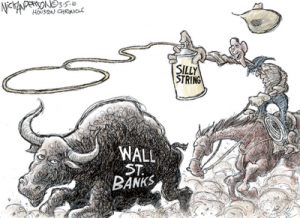Has Anything Changed on Wall Street?
 By Greg Hunter’s USAWatchdog.com
By Greg Hunter’s USAWatchdog.com
Whistleblower Harry Markopolos is on the stump promoting his new book titled “No One Would Listen.” It is about how it took 8 ½ years for the Securities and Exchange Commission to crack down on the Bernie Madoff scam. Markopolos says he sent letters to the SEC that were “too many to count” in an effort to expose the fraud. In an interview on “The Daily Show” this week, Markopolos said something about the SEC that really caught my attention. He said, “They still have all the same people there. They haven’t fired anybody, that’s the problem.” (The complete Daily Show segment is below)
The SEC missed the single biggest fraud in history (estimated at $65 billion) and not a single regulator lost their job over this screw-up? What is this regulatory body for but to protect investors? Is the SEC really just a public relations ploy to make people think Wall Street is being regulated? That’s the way it looks to me when I hear there is no house cleaning going on. There is no effort to change the tone and direction of the agency. It is just business as usual, and that’s the way Wall Street likes it.
Speaking of the Madoff scam, angry investors are suing the Securities Investment Protection Corporation (an industry insurance fund) to get some of their money back. May I simplify the real problem for you here? I called SIPC yesterday and asked how much is in the insurance fund to pay jilted investors? I was told it was “$1.159 billion at the end of February.” How long do you think that is going to last when considering Madoff’s crime was $65 billion? How many other scams will this be able to pay off? There is simply not a lot of money in their fund considering the trillions of dollars in investments it is insuring. Is SIPC real insurance for a large calamity or just PR to make you “feel” safe?
What about the rest of Wall Street? Certainly there have been new laws and big changes made to protect against another meltdown? After all, it was Wall Street’s reckless investments that caused the financial crisis. Eighteen months after the mess started, there is not a single new law or regulation for the financial industry! According to a new Harris Poll released this week, 82% of Americans want the government to clamp down on the financial industry. There is legislation currently in Congress for new regulation and consumer protection, but there is no telling when or if anything will be passed.
So, does that mean we can continue along our merry way? Not according to people, such as Harvard law Professor Elizabeth Warren, who is part of a new nonpartisan group asking for stronger financial reforms. In a recent report the group warns of “Another financial crisis on the way.” An ABC News story also says, “The report warns that the country is now immersed in a “doomsday cycle” wherein banks use borrowed money to take massive risks in an attempt to pay big dividends to shareholders and big bonuses to management – and when the risks go wrong, the banks receive taxpayer bailouts from the government. “Risk-taking at banks,” the report cautions, “will soon be larger than ever.” (Click here for the complete ABC story.)
The European Union is not waiting for another fiscal calamity. This week, it simply barred Wall Street banks from government bond sales that are extremely lucrative. A story from The Guardian provides a reason for the move with this quote, “Governments do not have the confidence that the excessive risk-taking culture of the big Wall Street banks has changed and they still cannot be trusted to put the stability of the financial system before profit,” said Arlene McCarthy, vice chair of the European parliament’s economic and monetary affairs committee.” (Click here for the complete Guardian story.)
There is no doubt the U.S. needs financial reform, but it will not fix the tail spinning economy that Wall Street greed has already put in motion. Nothing has changed. There is still big time risk to you and your money in the next market meltdown. Don’t expect the SEC to be looking out after your best interests because Harry Markopolos says, “They work for Wall Street, not for us investors.”












Another Great one, my friend!!!!!!!!!!
Thank you
Hello All,
Risk is life. A risk-free life only exists in a utopian’s mind. Taxpayer’s cannot be the go-to-people to eliminate risk for Wall Street and Main Street.
We need to let failing companies die. The good ones will be reborn from bankruptcy. The worthless companies will go away. The unions that helped to bankrupt companies (like GM and Gettlefinger)will have to find a new host to blood-suck from (We do need unions; however, we need serious government oversight of Unions).
Insolvent institutions are like a cancer on your body; you must excise them or big trouble comes later.
thanks,
markm
Hey Greg,
When I can’t find one thing to take issue with, you know you’ve written a great article 😉
I’m not sure how accurate Harry Markopolous is in his assertion that the lawyers at SEC didn’t understand a Ponzi scheme when the evidence was handed to them.
IMO,the lesson to be learned from Madoff is not competence or lack thereof at the SEC; rather fear of retribution among the regulators. Take on a well connected whale like Madoff and you not only have to be right, you have to convince a 3 judge panel.
Fail to convict and your career is over.
The real lesson here is that corruption in our system is so vast and far reaching, well even Greg’s expose on AIG and Dylan Ratigan’s segments concluding that AIG committed insurance fraud is not only not being investigated; WE BAILED THEM OUT AND PAID THEM BONUSES!!!
Nothing short of a 2nd American Revolution will save us now.
All the best,
Thrash
Brad,
Thank you!
Greg
Greg could you do a article on pension funds. I heard something like the government was trying to get the funds to take more risk. Something about the government would have some kind of back up for them. What I think they want the funds to come back to this country. The pension that I have sent money overseas about 9 years ago. We tried to keep the fund invested at home but we were losing to much money. I just remember when the government got control of the teamsters fund it lost a big hunk of money. This is not the first time the government starts looking to see if they can get control of different funds.
Bob,
Good idea. Thank you for your support!
Greg